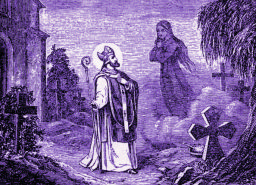A 12 year old murder victim teaches us how to forgive. A note on how to avoid 'the bitterness trap'
Presently America has the honour of having the relics of St Maria Goretti tour from church to church, the virgin-martyr born 125 years ago this month.
125 years ago this month, Maria Goretti was born in Italy. Poverty had a vice-like grip on her family. When she was six, her parents lost their farm and had to up sticks and earn a meagre living working for other farmers. Following the untimely death of her father, Maria, her mother and siblings moved again, and not begin able to afford a house of their own, had to share with the Serenelli family, which is where little Maria Goretti got to know their son, Alessandro.
Three years later, the 18 year old Alessandro started lusting after 12 year old Maria. One afternoon while her mother was working in the fields, Alessandro sexually harassed little Maria. She stood up to him, warned him his salvation would be in jeopardy if he defiled her, and cried out, “No! It is a sin! God does not want it!” Enraged by her refusal to submit to him (and probably because she pricked his conscience) Alessandro lost all inhibitions and stabbed Maria 14 times.
While Maria lay on her death-bed, she forgave Alessandro. Alessandro was jailed, but remained unremorseful, indifferent to the grief he had caused Maria’s mother.
A few years after her death, Maria Goretti appeared to Alessandro in a dream, assured him that she forgave him and put lilies into his hands. Alessandro broke down and admitted that he was wholly guilty of her death. On being released from prison, he sought out Maria’s mother and begged her forgiveness. Copying her daughter’s example, Maria Goretti’s mum told Alessandro that she readily forgave him.
St Maria Goretti’s capacity and desire to forgive puts most of us to shame. Those of us who find it agonising to forgive small slights have only to compare our reluctance to forgive with St Maria Goretti’s total, unconditional willingness to forgive, and it shows us how far off the mark we are.
Her example seems so simple, and yet is crushingly hard to emulate. St Maria Goretti showed no hesitation in forgiving Alessandro. There is a lesson here for us, it is easier to set your will to forgive no matter what, instead of letting in the doubt of “will-I-forgive-or-won’t-I”. Our will is like a block of wood, and debating as to whether we are to forgive or not is like a sharp metal wedge that divides the will between bitterness and forgiveness, weakening the will to the extent that only half its power is dedicated to forgiveness.
Alessandro offers an essential lesson in asking for forgiveness. Admittedly, Alessandro was a child murderer and the vast majority of people are not guilty of so heinous an evil act. Thus, most people would take umbrage at being told that if Alessandro Serenelli can ask to be forgiven, then so can they. Yet those who have been hurt, even in small ways deserve the soothing balm of a sincere apology so they may heal.
Forgiveness is not a feeling, and some people may still feel angry and traumatised even after they have forgiven someone. The scars of trauma are like that from surgery, they need time to fade. I see Christians grow impatient with fellow Christians and non-Christians, who have suffered at the hands of others, telling them that they are “bitter” and “not living like Jesus”, if they have difficulty recovering. This is bad for both parties: there is little emphasis on asking the perpetrator to ask for forgiveness so the victim is less likely to enjoy healing, and without being told precisely how their actions have hurt others, the perpetrator may imperviously hurt others in the same way.
The Bitterness Trap
Bullies often berate their victims by calling them bitter and taunting the victim’s apparent inability to forgive – as a way of control freakery. The victim feels under pressure to prove they are not bitter by allowing the bully into their lives again.
I wrote this blog for The Catholic Herald on-line. To see all my work for the Herald to date, visit my author archive.





Comments
Post a Comment